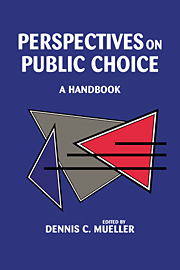Book contents
- Frontmatter
- Contents
- Preface
- Contributors
- 1 Public choice in perspective
- Part I The need for and forms of cooperation
- Part II Voting rules and preference aggregation
- Part III Electoral politics
- Part IV Individual behavior and collective action
- Part V Public choice in action
- References
- Name index
- Subject index
1 - Public choice in perspective
Published online by Cambridge University Press: 04 May 2010
- Frontmatter
- Contents
- Preface
- Contributors
- 1 Public choice in perspective
- Part I The need for and forms of cooperation
- Part II Voting rules and preference aggregation
- Part III Electoral politics
- Part IV Individual behavior and collective action
- Part V Public choice in action
- References
- Name index
- Subject index
Summary
Forerunners
Public choice applies the methodology of economics to the study of politics. As such it is inherently interdisciplinary and has been so more or less from its inception.
This inception might be said to have occurred over two hundred years ago in the investigations of the properties of voting rules undertaken by two french mathematicians, Jean-Charles de Borda (1781) and the Marquis de Condorcet (1785). Subsequent analytic investigations of voting rules over the next century were also largely carried out by mathematicians.
One of these, the Reverend Charles L. Dodgson, a lecturer in mathematics at Cambridge, is better known for his fictional works under the pseudonym Lewis Carroll. His pamphlets on voting procedures were published over a span of twelve years beginning in 1873 (Black 1958, chap. 20). Mention should also be made of the book by Dodgson's countryman, John Stuart Mill, published in 1861. Although Mill's Considerations on Representative Government contains no mathematical demonstrations of the kind found in Dodgson's pamphlets and should be regarded as a (classic) contribution to political science, it also can be viewed as the first investigation of political institutions by an economist.
Before leaving the nineteenth century the important contribution in 1896 of the Swedish economist Knut Wicksell must be noted. Although a “classic in public finance,” it also had a significant and direct influence on the development of public choice through the work of James Buchanan.
- Type
- Chapter
- Information
- Perspectives on Public ChoiceA Handbook, pp. 1 - 18Publisher: Cambridge University PressPrint publication year: 1996
- 1
- Cited by



